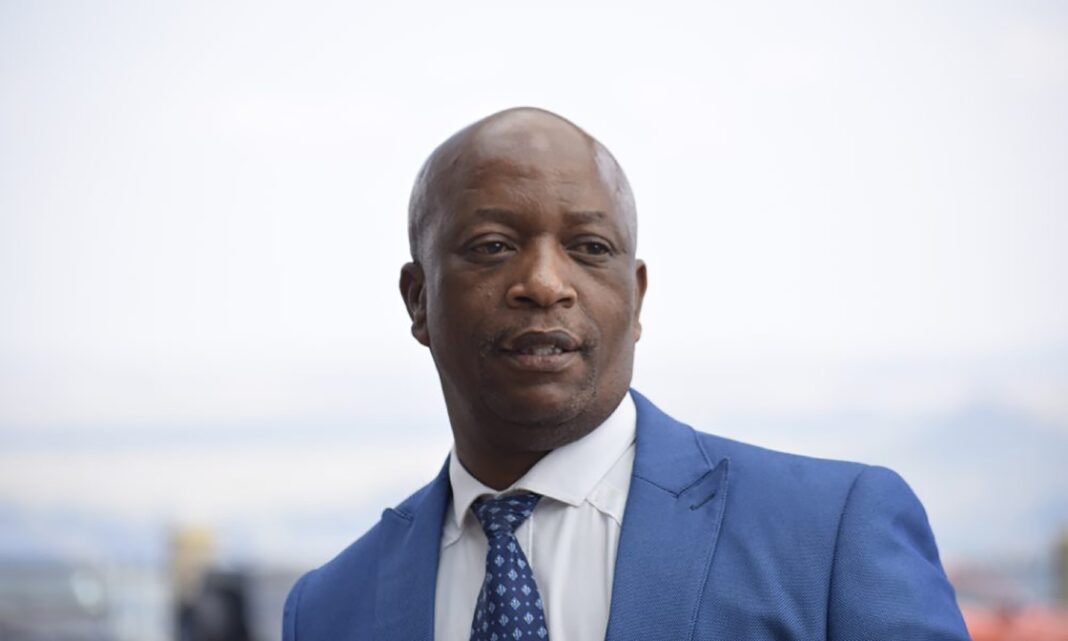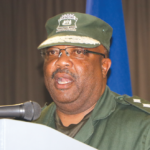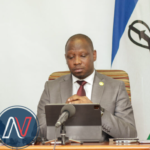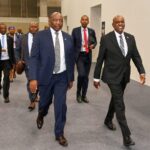- Claims MPs, ministers, and judges are SA citizens
- Wants to lead the Conquered Territory
- Begs UN for financial aid
Dr. Tšepo Lipholo, a fiery Member of Parliament (MP) and leader of the Basotho Covenant Movement (BCM), has ignited controversy with a petition claiming that every Lesotho government since independence in 1966 has been a puppet regime controlled by Pretoria, South Africa.
A full copy of the petition, obtained by Newsday, accuses successive administrations, including the current one led by Prime Minister Ntsokoane Samuel Matekane, of bowing to South African influence, thwarting efforts to reclaim what Lipholo calls the “Conquered Territory” of the Basotho.
This territory, lost to colonial and Boer encroachments decades ago, includes the entire Free State province and parts of other South African provinces.
Lipholo alleges this puppetry explains why Lesotho has never fought to restore these lands, as allegedly mandated by United Nations (UN) resolutions. His campaign hinges on a historical grievance dating back to the 1800s, when Basotho lands were reduced through wars with Boer settlers and British colonial agreements.
The 1869 Convention of Aliwal North formalised these losses and ceded vast territories to what is now South Africa. When Lesotho gained independence from Britain in 1966, it inherited these diminished borders, a decision reinforced by the Organisation of African Unity’s (OAU) 1963 pledge to respect colonial boundaries.
Lipholo’s petition, reportedly submitted to the UN General Assembly and Security Council earlier this year, invokes UN Resolutions which he says urged Britain to address Basotho land claims before independence, a call he says was ignored, leaving the issue unresolved.
His claims echo long-standing nationalist sentiments among some Basotho groups who believe that Lesotho should reclaim its pre-colonial boundaries.
However, successive Lesotho governments have largely maintained diplomatic relations with South Africa and refrained from pursuing territorial claims aggressively.
“Ever since 1966, South African government has been putting its own proxy governments in Lesotho whose leaders all had to report in Pretoria,” Lipholo stated in the petition.
“This has naturally resulted in all these proxy South African governments resisting to ensure the enforcement of the UN Resolutions, namely; granting of the full self-determination to the inhabitants and the return of all their land in the territorial Boundaries of Basutoland as directed,” he added.
Lesotho, a landlocked kingdom entirely surrounded by South Africa, relies heavily on its neighbour for trade, jobs, and infrastructure.
Lipholo cites a specific example to bolster his case that Lesotho is subjugated: a motion he introduced in Lesotho’s parliament on April 24, 2023, (Motion No. 8 on Reclamation of Lesotho Territory), which faced fierce opposition.
“Lesotho parliament’s heavy resistance of the Motion put by Petitioner to declare such territorial boundaries as ruled by this Assembly,” he wrote. He said some MPs suggested negotiating with South Africa for the land’s return, a proposal he deems unlawful.
“This matter is res judicata, the UN has already ruled South Africa an aggressor and ordered the land’s return. Lesotho has no business negotiating with them.”
He argued that such talks would undermine UN authority, render its resolutions toothless, and set a dangerous precedent under international law, and allow powerful states like South Africa to bully smaller nations unchecked.
“Needless to say that the said motion was finally frustrated and lost and such government has not even made endeavours to initiate such so-called negotiations with the said South African government,” he said.
In a bid to prove Lesotho’s subjugation, Lipholo made another bombshell claim.
“Most members of these proxy governments, in the Executive as ministers, in the judiciary, and in both houses of parliament—are South African citizens.” He alleged that many MPs and Senators hold South African identity cards, some even commuting daily from South Africa, creating a blatant conflict of interest.
This, he said, violates Section 59 of Lesotho’s Constitution, which disqualifies anyone pledging allegiance to a foreign state from serving in parliament.
However, in a partial backtrack, he called on the UN to compel both governments to disclose which parliamentarians hold dual citizenship.
He asserted that MPs and senators have to reveal this, as their votes against Basotho interests align with their allegiance to South Africa.
“It is clear that such MPs and Senators have violated the provisions of the very Constitution which they are supposed to uphold and RSA has a duty to disclose their citizenship as we have a reason to believe that they have misused their positions to vote against the interests of indigenous inhabitants of Lesotho for the implementation of the Resolutions of this General Assembly when they owe their allegiance to a foreign government being RSA,” he said.
1986 military coup and LHWP treaty
Lipholo further alleged that the apartheid government in Pretoria orchestrated a military coup in Lesotho in 1986, toppling Prime Minister Chief Leabua Jonathan, to tighten its grip on the mountain kingdom.
The coup, he claimed, paved the way for the Lesotho Highlands Water Project (LHWP) treat, an agreement he called “infamous”, that handed South Africa indefinite control over Lesotho’s most precious resource: water.
For Lipholo, this is more than a historical footnote, he said it is evidence of ongoing exploitation.
Lesotho’s political landscape shifted dramatically on January 20, 1986, when a military coup ousted Jonathan, ending his 20-year rule. Jonathan, leader of the Basotho National Party (BNP), had governed since independence in 1966 but faced mounting tensions after refusing to cede power following a disputed 1970 election.
His government’s growing defiance of apartheid South Africa, Lesotho hosted African National Congress (ANC) exiles and criticised Pretoria’s policies, strained relations with its powerful neighbour.
Lipholo alleged that South Africa, unwilling to tolerate this resistance, “closed all the borders of Lesotho and sponsored its proxies” to execute the coup, violating international norms protecting landlocked states’ sovereignty.
Historical accounts partly support this narrative. In early 1986, South Africa imposed a border blockade, citing security concerns over ANC activities, crippling Lesotho’s economy, which relied on South African trade routes.
Days later, Major General Justin Lekhanya seized power with little bloodshed, installing a military junta.
While direct evidence of Pretoria’s sponsorship remains debated, the timing, followed by Lekhanya’s swift alignment with South Africa, lends credence to suspicions of external influence.
Lipholo framed this as a deliberate sidestep of UN Security Council resolutions which condemned South Africa’s economic pressure on Lesotho and urged support for its independence.
The coup’s aftermath saw the rapid signing of the LHWP treaty in October, 1986, between South Africa and Lesotho’s new military regime. Billed as a win-win development project, the LHWP aimed to supply water to South Africa’s industrial Gauteng province while generating hydropower and royalties for Lesotho.
Phase I, including the Katse Dam, Africa’s second-largest double-curvature arch dam, began construction in the 1990s.
Lipholo, however, sees the treaty as a predatory deal.
“Immediately after toppling Jonathan, South Africa signed an infamous treaty with its proxies, giving itself Lesotho’s only precious commodity, water, for an indefinite period.”
He argued that the treaty granted South Africa perpetual leases on Lesotho land within the project area, a move he said contradicts Lesotho’s Land Act, which caps leases at 100 years even for citizens.
“This means the land and water of the Basotho are permanently occupied and owned by South Africa,” Lipholo asserted.
In contrast, he said, Lesotho receives royalties for only 50 years, with no adjustments since the treaty’s inception 37 years ago, despite provisions for review.
The lack of parliamentary oversight, he noted no review has occurred, fuels his claim of a rigged arrangement favouring Pretoria.
The LHWP’s impact on Basotho communities adds weight to Lipholo’s critique. Over 20,000 people were displaced by Phase I, losing homes, farmland, and access to communal resources like medicinal plants and grazing pastures.
Compensation has been a flashpoint. Lipholo alleged that rates were as low as 68 lisente per square meter for arable land, translating to annual payments of less than M16 for some families, far below any poverty line.
“There’s been no compensation for communal land or useful plants for 37 years,” he stated, calling the rates “inhuman” and a stark undervaluation of Basotho livelihoods.
Ongoing Phase II, featuring the Polihali Dam in Mokhotlong, deepens the controversy. Lipholo claimed it is built on “prime areas with 400 diamond pipes,” citing geological reports that allegedly suggest untapped mineral wealth beneath the reservoir sites.
He alleged that 18 failed feasibility studies were ignored to push the project forward, prioritising South Africa’s water needs over Lesotho’s economic potential.
While diamond estimates vary, Lesotho’s known kimberlite pipes have yielded gems like the 910-carat Lesotho Legend. Experts agree that Mokhotlong district probably holds significant deposits.
In conclusion, Lipholo demanded recognition, restoration, and return of the Conquered Territory of Basutoland as a sovereign state under his interim leadership and financial and technical assistance from the UN to achieve full self-determination for this reclaimed state, per past resolutions.
Summary
- Tšepo Lipholo, a fiery Member of Parliament (MP) and leader of the Basotho Covenant Movement (BCM), has ignited controversy with a petition claiming that every Lesotho government since independence in 1966 has been a puppet regime controlled by Pretoria, South Africa.
- A full copy of the petition, obtained by Newsday, accuses successive administrations, including the current one led by Prime Minister Ntsokoane Samuel Matekane, of bowing to South African influence, thwarting efforts to reclaim what Lipholo calls the “Conquered Territory” of the Basotho.
- Granting of the full self-determination to the inhabitants and the return of all their land in the territorial Boundaries of Basutoland as directed,” he added.

Authored by our expert team of writers and editors, with thorough research.









